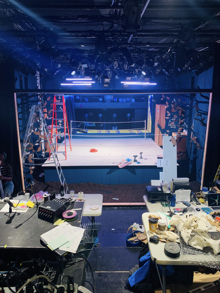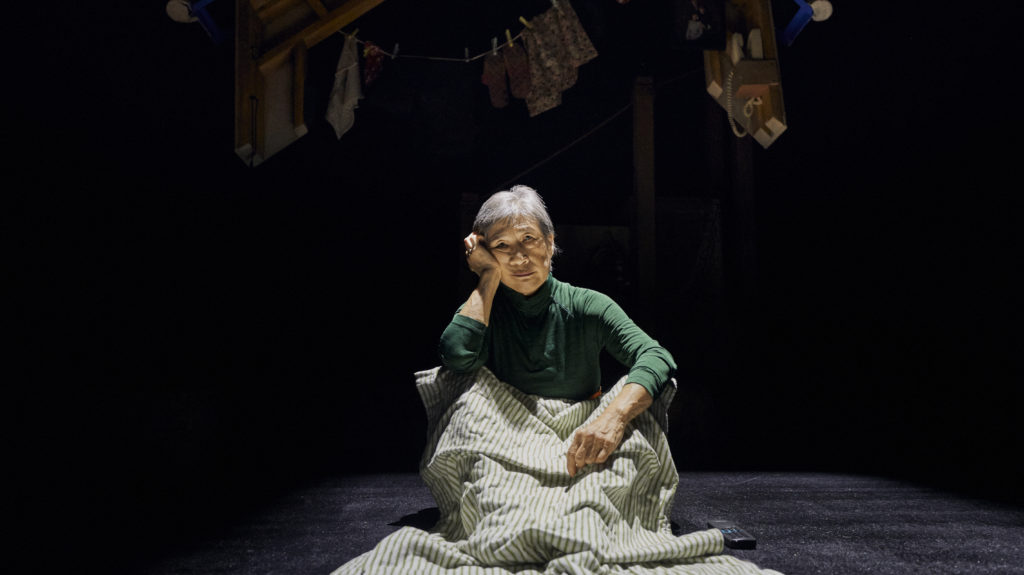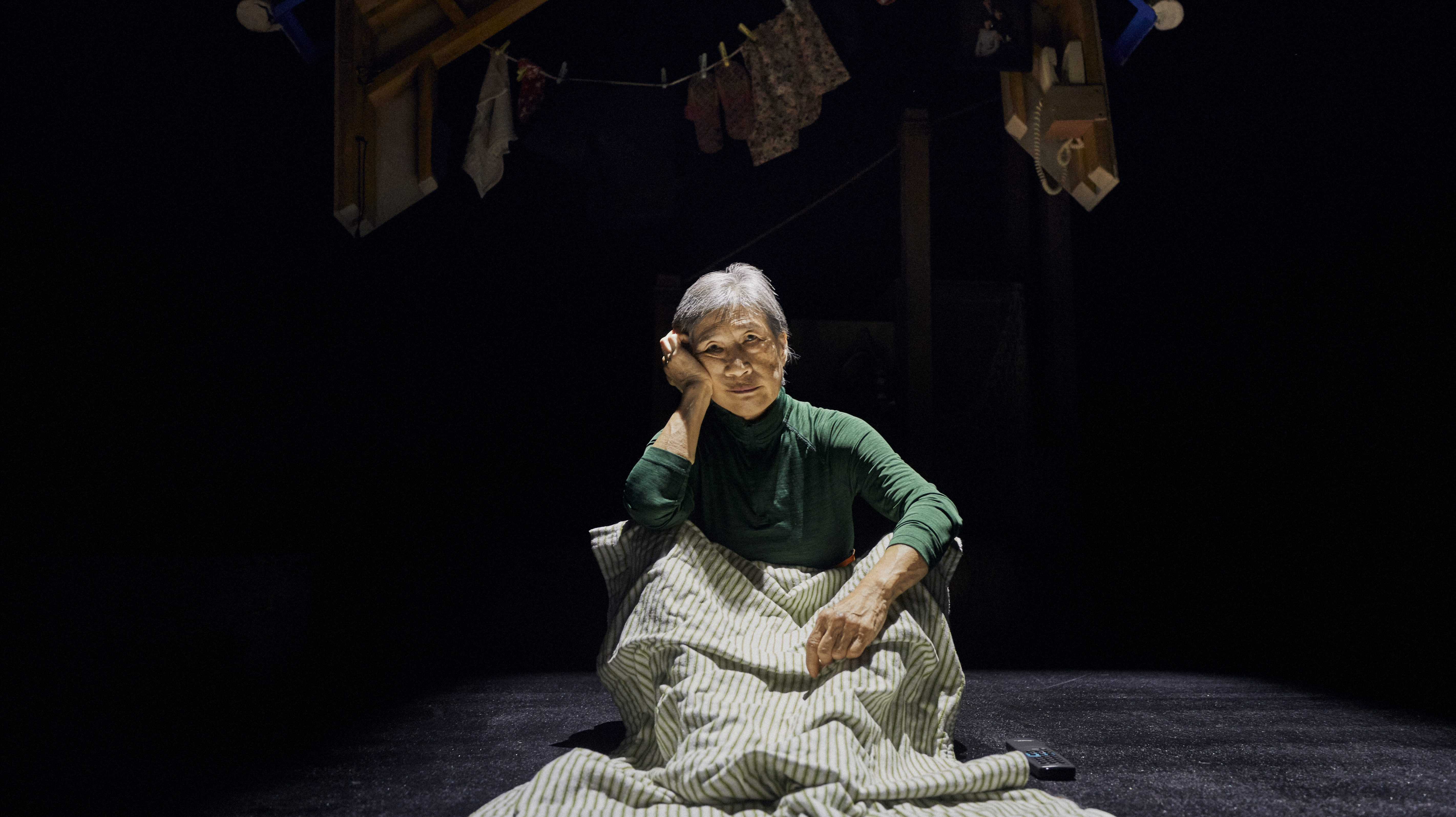
It was day three of technical rehearsals for Wolf Play at Soho Rep. and the creative team prepared to make a first pass at the play’s climactic boxing match.
Onstage, microphones rained down from the ceiling as Jin Ha juggled radio announcing, puppeteering, and playing a wolf while Esco Jouléy executed carefully choreographed boxing moves inside a ring. In the house, the design team worked at tables littered with coffee cups, cables, and spike tape as a friend of the team watched from nearby.
Then, the word came: in five minutes, the theater’s leadership team was coming in to suspend production.
So for five more minutes, the team teched the scene for their audience of one.
“It felt like Titanic: it’s like, ‘Keep playing!’” director Dustin Wills said. “But we were really looking forward to this moment in tech and at least we were going to see what it looks like, damn it.”
Playwright Hansol Jung agreed. “It was gorgeous.”
Jung began writing Wolf Play in 2014. Coming to Soho Rep. for a New York premiere was ideal: “This is my favorite theater in the world and they’re doing this play. I thought it would never happen. That’s what I was always saying. And now it looks like it will maybe not happen.”
Across an industry with tight finances in the best of times, artists are being rocked by the nationwide shuttering of theaters. As companies cancel productions that were months to years in the making in the name of social distancing and self-quarantining, people whose work depends on bringing people together remain in a particularly precarious position.
The whiplash of the moment is striking. At the beginning of last week, Jessica Blank met family members of the victims of the Upper Big Branch mining disaster in West Virginia who traveled to the Public Theater to see their stories on stage in Coal Country. By the end of the week, the show she directed and co-wrote had closed.
“You don’t know where the next step of the process is going to come from, especially in times like these,” Blank said. “I think that’s always true. We think we can predict it normally and then something like this forces us into admitting that we don’t actually know what’s going to happen next.”
While most, including Blank and Jung, expressed hope for another life for their shows, deep uncertainty abounds about the future. Which theaters will survive if this crisis continues for three months? Six? More? In the meantime, what does theater look like when people can’t occupy the same spaces as one another? Who will be able to pay their bills? And might those bills include unforeseen medical expenses?
Many were bleak. “Unless there are some major interventions, I don’t know how any of the tiny theaters are coming back,” said Daniel Goldstein, the bookwriter for Unknown Soldier, a musical that ran at Playwrights Horizons before closing last week. “Right now I’m just trying to put one foot ahead of the other and figure out finances, figure out family, figure out schooling my kids, figure out feeding everybody, figure out how to have two kids at home and both parents with jobs to do. All of these things are full-time jobs.”
Brittany K. Allen, whose show Redwood at Ensemble Studio Theatre was postponed from a planned April opening, shared Goldstein’s concerns. “Most of these non-profits don’t have any cash reserve, so there’s a death knell hanging over a lot of these institutions, I think. A really long shuttering could ripple through Off-Broadway in a way people aren’t able to process or think about right now.”
Still, Allen described herself as humbled, but cautiously optimistic in this moment. “I’ve seen a lot of good leadership from artists this week and watched people really come out for each other,” she said. “It’s reminded me of the best things about this community.”
To playwright Celine Song, the need to close theaters right now was clear: “The sites of mass infection have been churches or synagogues,” she said. “And it makes a lot of sense to me. Theater is a kind of church.”
But it was still deeply painful to see her play Endlings, which ran at New York Theatre Workshop, close prematurely—particularly on behalf of her actors.

“Every single one of them was doing incredible work and I think that’s what the saddest part is. It’s really not ‘Celine Song doesn’t get to do her play.’ The thing that I think is so sad is just how good their work has been. They should’ve been able to be seen by 200 people every night.”
Her director Sammi Cannold worried about the long-term ramifications for directors just beginning to work in the city.
“If this had happened five years ago for me, it would have been devastating for my career.”
Cannold envisioned a world where assistant and associate directors—important sources of support for established directors— see what little funding there was for their work before the coronavirus outbreak dry up. As a result, directing as a career could become even more inaccessible to those who cannot afford to work for free.
“I have a career as a director because I was given opportunities as an assistant and an associate and had the opportunity to sit in rooms of directors I admired and watch them direct. For privileged young people, they can offer to be in those rooms for free, but that does not apply to everybody—by no means.”
For Charly Evon Simpson, the Pipeline Festival at the WP Theater would have been an opportunity to workshop her play Sandblasted on its feet for the first time. After writing the play Behind the Sheet about the history of gynecology, she grew interested in the dismal mortality rates for Black mothers in America. Drawing on Samuel Beckett “and a lot of sand,” she hoped in Sandblasted to make visible the physical toll of the stress Black women face in America.
Before the workshop’s cancellation, she was still searching for an ending to her play.
“I really was trying to figure out how to end a play about a thing that still hasn’t ended without the play forcing us to leave with a sense of hopelessness. I wanted to end on a helpful note and a joyful note and a loving note. And I knew that that was going to be something that I wanted to be in a room looking at with all of these people together,” Simpson said.
For the immediate future, that search for an ending—like most of our lives and work for an indeterminate number of weeks— will happen instead at home. “It was going to be an exciting but scary share. Now it’s just exciting and scary for me on my computer.”
Read the original article here.
Author
-
Daniel Krane is a Brooklyn-based director, playwright, and arts journalist. He was the Civilians' Editorial and Social Media Intern for the 2019-2020 season. In addition to his work at the Civilians, he served as the Artistic Director at Princeton Summer Theater for two critically-acclaimed seasons, and has worked for the Public Theater's Public Works program and the Brooklyn Arts Exchange. His writing has been featured in American Theatre Magazine, Exeunt NYC, and Extended Play. He received his B.A. from Princeton University in 2018, where he studied Portuguese and Theater. DanielKrane.com
View all posts









